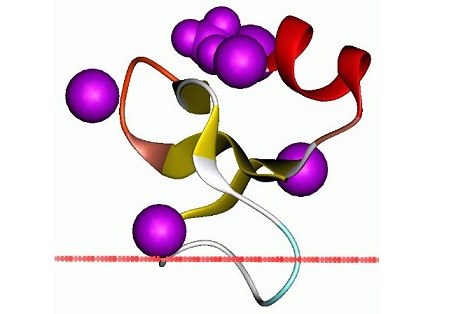Nikhil Prasad Fact checked by:Thailand Medical News Jul 25, 2024 1 year, 6 months, 1 week, 5 days, 8 hours, 42 minutes ago
Cancer Updates: Colorectal cancer (CRC) is a major global health concern, ranking as the third most common cancer worldwide. The rising incidence among younger adults, those under 50, is particularly alarming. Researchers are investigating the potential links between diet, the gut microbiome, and CRC risk. This
Cancer Updates news report explores recent discoveries about human defensins, particularly Human Beta-Defensin 1 (HBD-1), and their complex roles in CRC progression. The study aims to shed light on new diagnostic tools and therapeutic strategies.
 Defensins - The Double-Edged Swords in Colorectal Cancer Progression
The Crucial PI3K/AKT/mTOR Pathway
Defensins - The Double-Edged Swords in Colorectal Cancer Progression
The Crucial PI3K/AKT/mTOR Pathway
The PI3K/AKT/mTOR pathway is a key regulator of cell growth, proliferation, and survival. In CRC, the mTOR pathway plays a significant role. It comprises two complexes: mTORC1 and mTORC2, which influence various cellular processes. mTORC1 is involved in translation, transcription, and nutrient transport, while mTORC2 controls cell growth through cytoskeleton regulation.
Human Defensins: Natural Defenders
Defensins are small, positively charged proteins produced by immune cells and epithelial tissues. They play a crucial role in the body’s defense mechanisms. There are two main types in humans: alpha-defensins and beta-defensins. Alpha-defensins are secreted by Paneth and neutrophil cells, while beta-defensins are secreted by epithelial cells.
HBD-1: A Potential Tumor Suppressor
Human Beta-Defensin 1 (HBD-1) exhibits potent antimicrobial activity and might also act as a tumor suppressor. Its expression is generally lower in tumor tissues compared to healthy tissues in various cancers, including colorectal, liver, and skin cancers. HBD-1's ability to suppress cancer cell growth, migration, and invasion positions it as a promising candidate for cancer therapy.
Defensins and Cancer Progression
Defensins have shown complex roles in cancer biology. For instance, while HBD-1 might act as a tumor suppressor, other defensins, like HBD-3, have been linked to cancer progression. HBD-3 is associated with migration, invasion, and cell death in cancers like Lewis lung carcinoma and CRC. The varying effects of different defensins highlight the need for further research to understand their regulation and function in different cancers.
The Role of Long Non-Coding RNAs (lncRNAs)
Long non-coding RNAs (lncRNAs) are emerging as significant players in CRC. They influence various cellular processes crucial for tumorigenesis, such as cell proliferation, apoptosis, and drug resistance. Certain lncRNAs have been associated with improved CRC prognosis. For example, lncRNA miR663AHG, which is downregulated in CRC tumors, shows potent anti-cancer properties. Understanding lncRNA roles could lead to new diagnostic and therapeutic targets.
mTOR Pathway: A Target for CRC Therapy
Targeting the mTOR path
way has shown promise in controlling CRC progression. Aberrant activation of this pathway is frequently observed in cancers, leading to uncontrolled cell growth and metastasis. Inhibiting the mTOR pathway could potentially improve CRC treatment outcomes.
Defensins and the Gut Microbiota
The gut microbiota (GMB) plays a crucial role in health and disease. Defensins, produced in the gut, help maintain a balanced microbiome. Dysbiosis, or imbalance in the GMB, can trigger inflammation and lead to severe disorders. Defensins like HBD-1 help prevent such imbalances, suggesting their potential in therapeutic strategies for gut-related diseases and CRC.
Research Findings and Future Directions
Recent studies highlight the multifaceted roles of defensins in CRC. Defensins not only eliminate cancer cells but also recruit immune cells to tumors, bridging innate and adaptive immunity. This dual role positions them as potential therapeutic targets. However, many questions remain about their mechanisms of action and regulation.
Conclusion
Defensins exhibit surprising versatility in regulating cancer and gut health. Their ability to eliminate cancer cells, recruit immune cells, and maintain a balanced gut microbiome underscores their therapeutic potential. Future research should focus on manipulating defensin levels and understanding their molecular mechanisms to unlock new cancer treatments.
The study findings were published in the peer-reviewed journal: Cancers.
https://www.mdpi.com/2072-6694/16/15/2622
For the latest
Cancer Updates, keep on logging to
Thailand Medical News.
Read Also:
https://www.thailandmedical.news/news/the-role-of-mirna-in-colorectal-cancer
https://www.thailandmedical.news/news/herbs-and-phytochemicals-oleuropein-from-olive-leaf-can-help-against-colorectal-cancer
